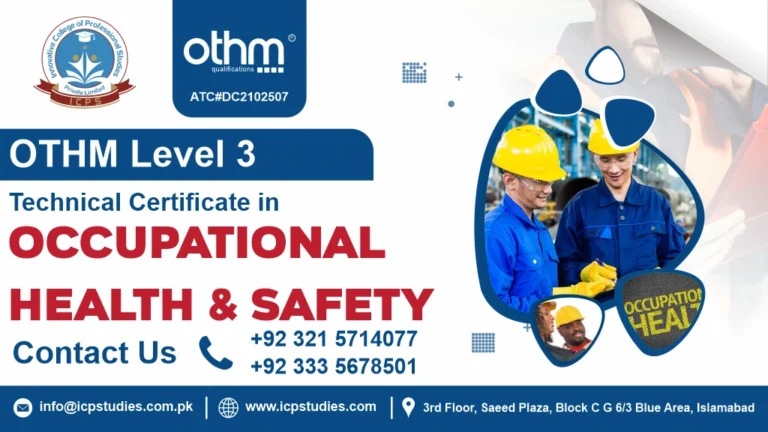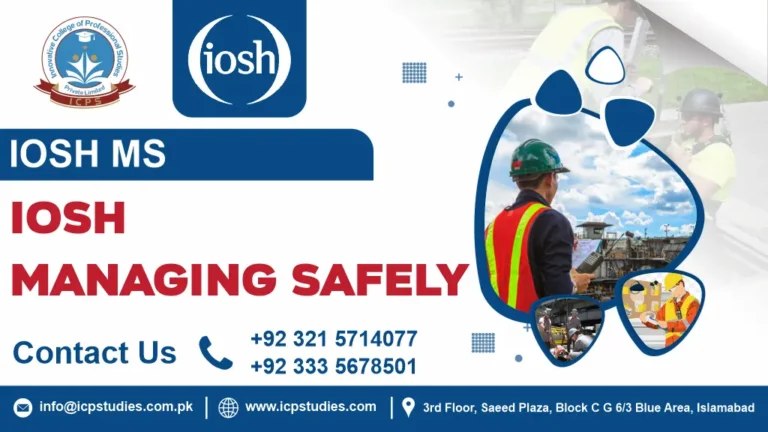In today’s globalized and interconnected world, the need for professionals skilled in health, safety, and environmental engineering has never been more critical. The Level 7 International Diploma in Health, Safety, and Environmental Engineering offers a comprehensive educational pathway designed to equip individuals with the knowledge, skills, and competencies required to excel in this dynamic field.
The Level 7 International Diploma in Health, Safety, and Environmental Engineering is a rigorous program aimed at professionals aspiring to lead and manage health, safety, and environmental initiatives within organizations worldwide. This diploma is recognized internationally for its depth of content and practical applicability in various industries, from manufacturing and construction to healthcare and oil and gas.
Level 7 International Diploma in Health, Safety, and Environmental Engineering is a gateway to a rewarding career in a field crucial to the sustainability and well-being of organizations worldwide. By equipping professionals with advanced knowledge and practical skills, this diploma empowers them to make significant contributions towards safer workplaces, environmental stewardship, and regulatory compliance on a global scale.
All About ICTQual Level 7 international Diploma in Health, Safety and Environmental Engineering
Course Overview
The Level 7 International Diploma in Health, Safety, and Environmental Engineering is an advanced qualification designed to provide comprehensive knowledge and skills in managing health, safety, and environmental (HSE) concerns within various industries. It is typically offered by accredited educational institutions and recognized globally for its depth of content and practical applicability.
Level 7 International Diploma in Health, Safety, and Environmental Engineering is a prestigious qualification designed to equip professionals with the expertise needed to manage and mitigate risks, ensure workplace safety, and promote environmental stewardship on a global scale. It serves as a catalyst for career advancement and leadership opportunities in industries where HSE management is critical for organizational success and sustainability.
Study Units
- Foundations of Health, Safety, and Environmental Engineering
- Risk Assessment and Management
- Occupational Health and Safety Management
- Environmental Management Systems
- Emergency Preparedness and Response
- Sustainability and Corporate Social Responsibility
- Applied Health, Safety, and Environmental Engineering
The entry requirements for the ICTQual Level 7 International Diploma in Health, Safety and Environmental Engineering typically include:
- Educational Background: A relevant undergraduate degree (such as in engineering, science, or health and safety) or equivalent qualification.
- Work Experience: Significant professional experience in health, safety, or environmental management is usually required, often at a supervisory or management level.
- Professional Qualifications: Existing health and safety certifications (e.g., NEBOSH, IOSH) may be beneficial but are not always mandatory.
- Language Proficiency: Proficiency in English, as course materials and assessments are typically conducted in English.
- Motivation and Commitment: A demonstrated commitment to advancing knowledge in health, safety, and environmental engineering.
- Registration: Completion of necessary registration forms and payment of any applicable fees.
Always check with the specific training provider for any additional or specific entry requirements, as they may vary.
4o mini
The ICTQual Level 7 International Diploma in Health, Safety and Environmental Engineering is designed for:
- Health and Safety Professionals: Individuals looking to advance their careers in health and safety management and enhance their expertise.
- Environmental Managers: Professionals responsible for implementing and managing environmental policies and practices within organizations.
- Safety Officers and Advisors: Those seeking to deepen their knowledge of health and safety regulations and best practices.
- Engineers: Engineers involved in health, safety, and environmental aspects of their projects, particularly in high-risk industries.
- Managers and Supervisors: Individuals in management roles who need to ensure compliance with health and safety standards and practices.
- Consultants: Those providing consultancy services in health, safety, and environmental management.
- New Entrants: Individuals aiming to enter the health and safety field at a senior level with a strong educational foundation.
This course provides participants with advanced knowledge and skills necessary to effectively manage health, safety, and environmental challenges in various sectors.
Learning Outcome
Foundations of Health, Safety, and Environmental Engineering
Learning Outcomes:
Understand the fundamental principles and concepts of health, safety, and environmental engineering.
Recognize the importance of integrating health, safety, and environmental considerations into organizational practices.
Apply foundational knowledge to analyze and address common HSE challenges in various industries.
- Risk Assessment and Management
Learning Outcomes:
Identify potential hazards and risks in workplace environments.
Apply risk assessment methodologies to evaluate the likelihood and consequences of identified risks.
Develop risk management strategies to mitigate risks and ensure a safe working environment.
- Occupational Health and Safety Management
Learning Outcomes:
Interpret and comply with occupational health and safety regulations and standards.
Implement effective safety management systems to prevent accidents and occupational illnesses.
Conduct audits and inspections to assess compliance with health and safety requirements.
- Environmental Management Systems
Learning Outcomes:
Understand the principles and components of environmental management systems (EMS).
Implement EMS frameworks such as ISO 14001 to manage environmental impacts effectively.
Monitor and improve environmental performance through continuous evaluation and adaptation of EMS.
- Emergency Preparedness and Response
Learning Outcomes:
Develop emergency preparedness plans to respond effectively to potential crises and disasters.
Coordinate emergency response efforts to minimize health, safety, and environmental impacts.
Evaluate and revise emergency protocols based on post-incident reviews and lessons learned.
- Sustainability and Corporate Social Responsibility
Learning Outcomes:
Define sustainability and corporate social responsibility (CSR) principles in the context of HSE engineering.
Integrate sustainability practices into organizational strategies to achieve long-term environmental and social benefits.
Engage stakeholders and communicate effectively about sustainability initiatives and achievements.
- Applied Health, Safety, and Environmental Engineering
Learning Outcomes:
Apply theoretical knowledge and practical skills to solve real-world HSE engineering challenges.
Utilize tools and techniques to analyze complex HSE problems and propose innovative solutions.
Demonstrate proficiency in project management, risk communication, and decision-making in HSE contexts.
Who Should Pursue This Course?
The study units outlined above are tailored for professionals and individuals aspiring to specialize in health, safety, and environmental engineering. This course is suitable for:
HSE Managers and Practitioners: Seeking to enhance their knowledge and skills in managing health, safety, and environmental risks.
Engineers and Technicians: Wishing to specialize in HSE practices within industries such as manufacturing, construction, energy, and healthcare.
Consultants and Auditors: Involved in advising organizations on compliance with HSE regulations and best practices.
Environmental Scientists and Sustainability Managers: Interested in integrating environmental management principles into organizational strategies.
Future Progression
Upon completing the course, individuals can pursue:
Further Education: Advance to higher academic qualifications such as a master’s degree or specialized certifications in health, safety, or environmental engineering.
Professional Development: Obtain certifications from professional bodies related to HSE management, enhancing credibility and career prospects.
Career Advancement: Access senior management roles in multinational corporations or consulting firms specializing in HSE management and sustainability.
Conclusion
The study units and learning outcomes of the Level 7 International Diploma in Health, Safety, and Environmental Engineering provide a robust foundation for professionals aiming to excel in managing health, safety, and environmental challenges. By acquiring comprehensive knowledge and practical skills, graduates are well-equipped to lead initiatives that promote workplace safety, environmental stewardship, and sustainable development across diverse industries globally
FAQs about ICTQual Level 7 international Diploma in Health, Safety and Environmental Engineering







